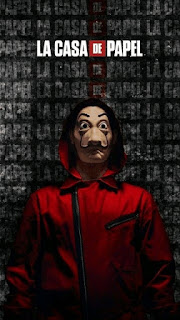What's the one tune that you have hooked on to in this lockdown? No super magic involved but it certainly is "Bella Ciao" popularised by the Spanish Netflix Special "Money Heist". The song taught to El Professor by his grandfather has certainly become an anthem that unifies all the anti-fascist protests across the world. What's the story behind " Bella Ciao" and how has it become a unifying force among all the protests carried out against the governments of the world.
 "Bella Ciao" is Italian for Goodbye Beautiful. It is originally an Italian protest folk song that originated in the hardships of the 'Mondina' women, the paddy field workers in the late 19th century who sang it to protest against harsh working conditions in the paddy fields of North Italy.
"Bella Ciao" is Italian for Goodbye Beautiful. It is originally an Italian protest folk song that originated in the hardships of the 'Mondina' women, the paddy field workers in the late 19th century who sang it to protest against harsh working conditions in the paddy fields of North Italy.“Oh my mother, what a torment, Bella Ciao” and the lines “but the day will come when we all work in freedom” soon became an anthem of the working population and a song that roared of rebellion and freedom.
The ode that breathed defiance against the ruling order was picked up by the anti-fascist movement in Italy against Benito Mussolini and the Nazis by various resistance groups, popularly known as partisans, between 1943 and 1945 during World War II. The author of the lyrics is unknown.
Its lines were then modified accordingly to fit the war narrative. The partisan replaced the paddy field worker, who was out to defend the German invaders from his motherland. He later requests to be buried under a flower if he would ever lose his life.
“And if I die, as a partisan, you must bury me up in the mountains, under the shadow of a beautiful flower.”
 “And all those passing by will exclaim, what a beautiful flower, Bella Ciao. The flower of the partisan who died for our freedom.”
“And all those passing by will exclaim, what a beautiful flower, Bella Ciao. The flower of the partisan who died for our freedom.”The newly formed Italian Republic was founded on this struggle of the resistance.
It spread across boundaries faster than wildfire, to gain international recognition as the hymn of freedom, and was used explicitly in many revolutionary events around the world since then. People gathered by the thousands in Barcelona, Greece, Tunisia, and Puerto Rico in movements against the establishment and more recently in France’s Yellow Vest protests and in Palestine, against Trump’s failed ‘Deal of the Century.’
The song was also the inspiration for the EleNão movement against extreme right-wing Brazilian presidential candidate Jair Bolsonaro.
In March 2020, the song once again gained international attention after Europeans and Italians in lockdown due to the coronavirus pandemic in Italy and Europe sang "Bella ciao" from the balconies of their housing complexes.
As of 2020, the Chinese version of the song has been often used to accompany videos showing Uyghurs in state-run concentration camps or in forced labor that are uploaded to Douyin, the Chinese version of the TikTok app.
As once said Music is a unifying force that has no boundaries. How an anthem started off as a unifying force among farmworkers ended up being a nightmare of the most despotic governments is something that explains a lot about the power of music.